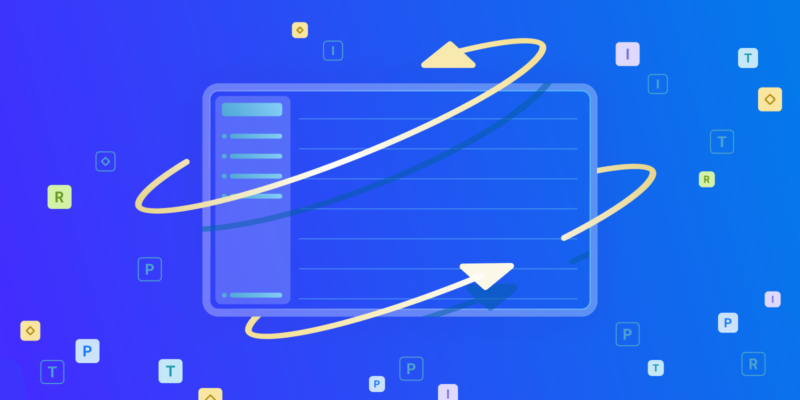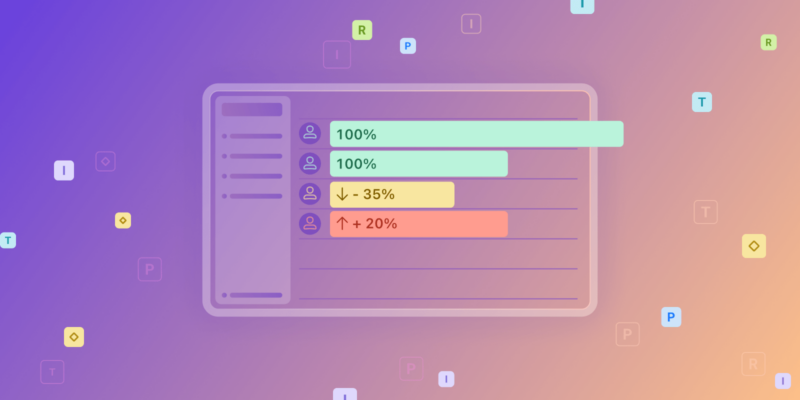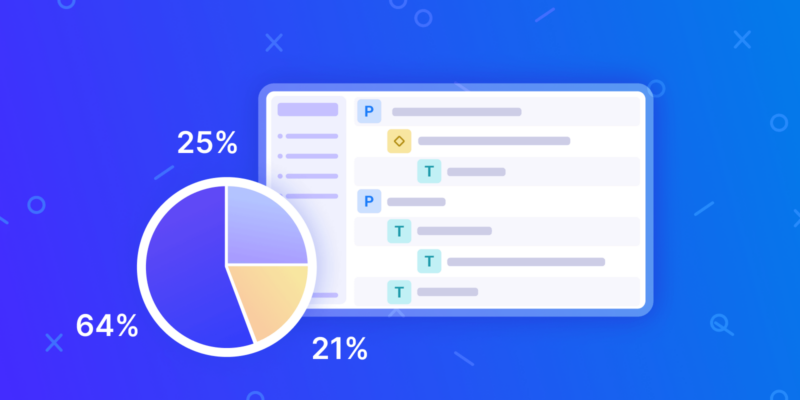The optimal project management software (PMS) is instrumental in achieving project success. A robotics project management adoption statistics report reveals that 77 % of high-performing projects use project management software.
Choosing a project management platform that meets your requirements does not need to be a complicated task. THis guide will help you choose the best project management solution for your organization
.
Key criteria to look for in a project management software
When considering how to choose project management software, it’s essential to understand that key criteria to look for in a project management software must address the diverse needs of your team and project. Must-have project management software features are essential functionalities that contribute to the effectiveness and success of project management. These features streamline processes, enhance collaboration, and ensure the successful completion of projects. We will use Birdview project management software as an example to show you the key must-have project management software features.
1. User-friendliness
First and foremost, you need to consider a project management solution that can be used by everyone on the project team. Evaluating how to choose project management software includes ensuring it’s user-friendly and accessible to all team members, potentially reducing the need for extensive training. Project management software requiring extensive training does not need to be a deal-breaker, though. Hence, you need to evaluate if its features are worth your team‘s time to get acquainted with the system. You can do further research and then try to compare the product with other alternatives. Some project management systems may offer the same features and benefits yet have an easier learning curve.
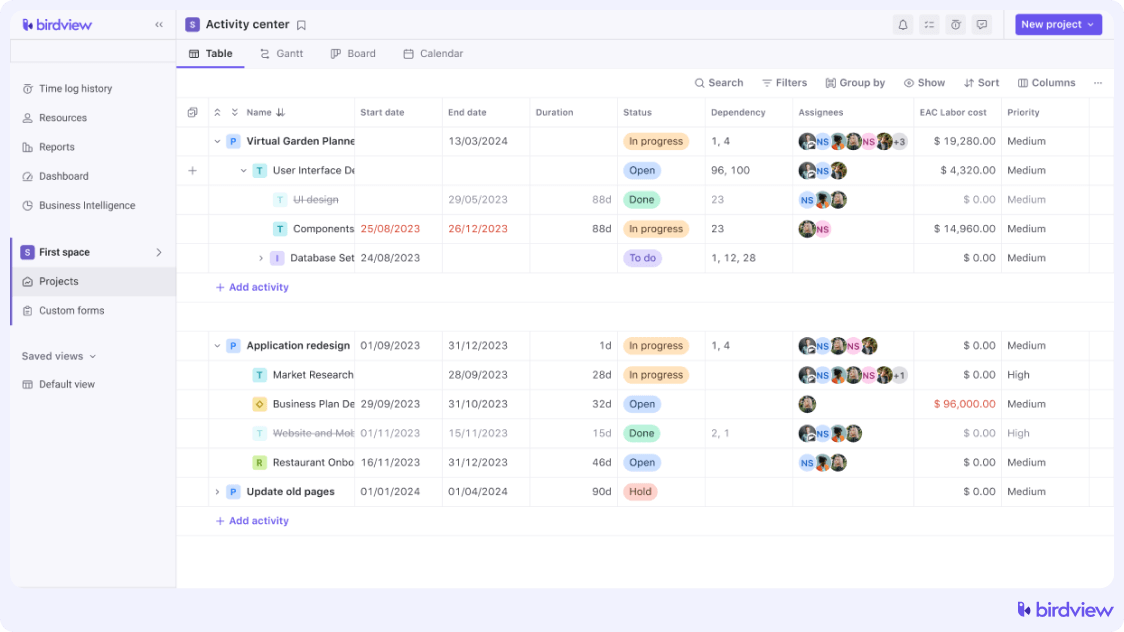
2. Project planning and scheduling
Understanding how to choose project management software involves looking for tools that help you effectively manage projects and stay on top of individual tasks and project schedules. Visualization is an effective way of pinpointing potential bottlenecks and ensuring that everyone is on the same page. So, make sure that your project management software provides you with tools to do just that. One particular must-have tool in project management software is a Gantt chart. You can use Gantt charts to plan and visualize your tasks and project schedules. This tool lets you see at a glance if you are on track or already falling behind schedule.
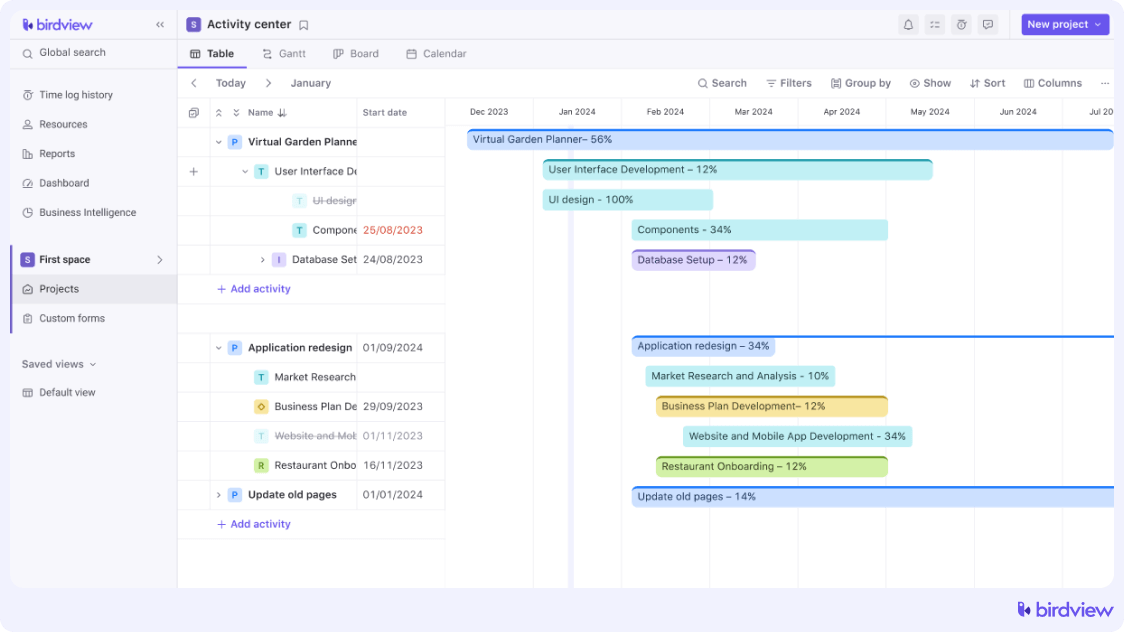
3. Project and task management
Another must-have feature of project management software is task management. It should allow you to create a list of tasks and deadlines and assign each task to a team member. After you have assigned these tasks, you should then be able to track each task‘s progress and generate reports, so you can assess process efficiency and take action when needed.
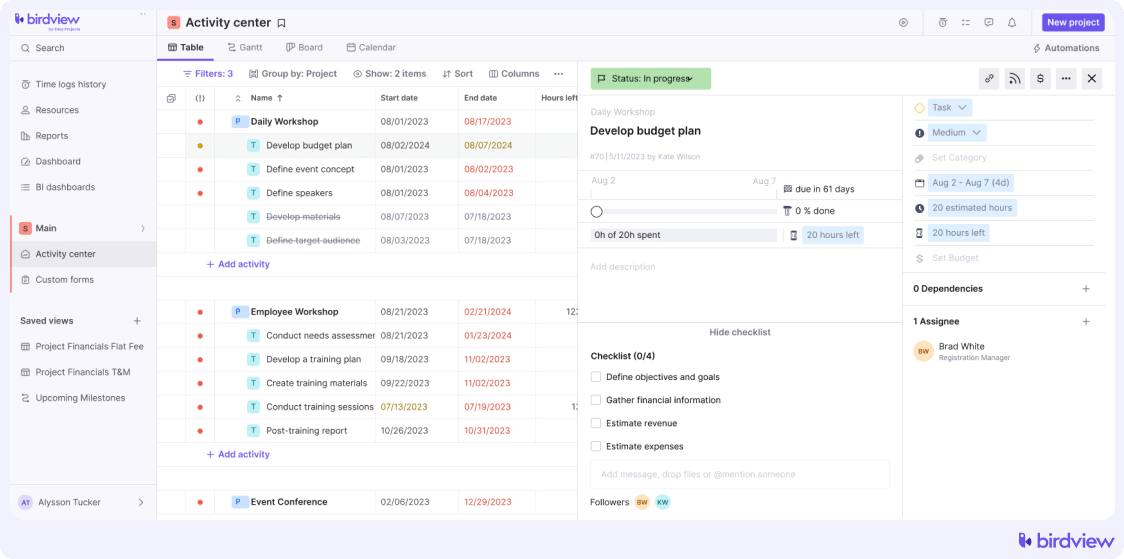
4. Resource management
Part of understanding how to choose project management software includes looking for a system that helps you effectively plan, schedule, and allocate resources efficiently. Resource management includes labor, time, equipment, and money. Project management software that has a resource management tool will allow you to see individual workloads and availability. With that feature at your disposal, you would be able to balance workloads, prioritize tasks, and optimize efficiency. Effectively managing these resources ensures that no one is burdened with a heavy workload, workers are not idling, and materials, equipment, and tools are available when needed. Ultimately, you will enhance employee retention and ensure that your team will accomplish the project on schedule.
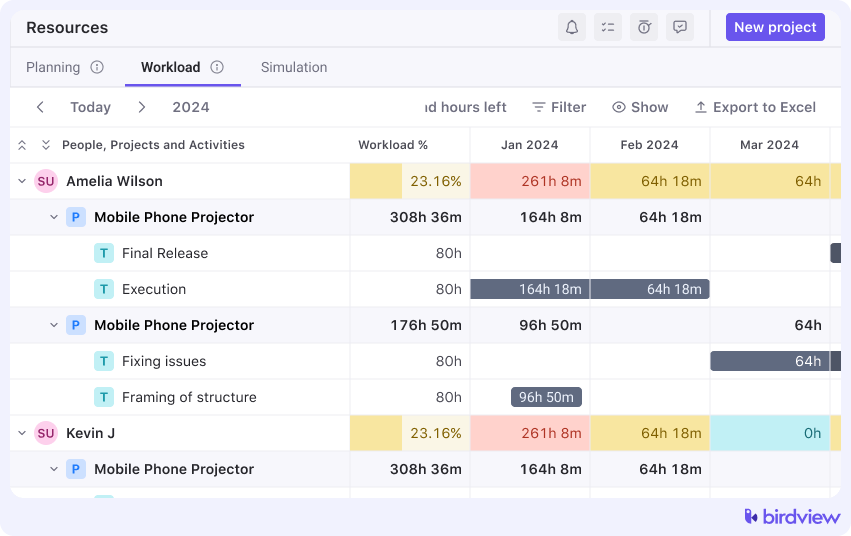
5. File-sharing and approvals
Your project management system should allow you and your team members to share and have access to documents, media, and other important digital files. Project managers should also have a way of controlling how these files will be added, viewed, read, and edited by assigning different levels of access. The project management software often has a range of options to make file-sharing possible, including media storage devices, shared hard drives, cloud-based storage, and SharePoint sites. A rule of thumb is to make sure that your project management solution supports multiple platforms, including Windows, iOS, Android, Mac, and various devices.
Another important project management tool requirement is streamlined approval workflows. This feature allows team members to request approvals directly within the task, ensuring that the process is both efficient and integrated with your ongoing work.
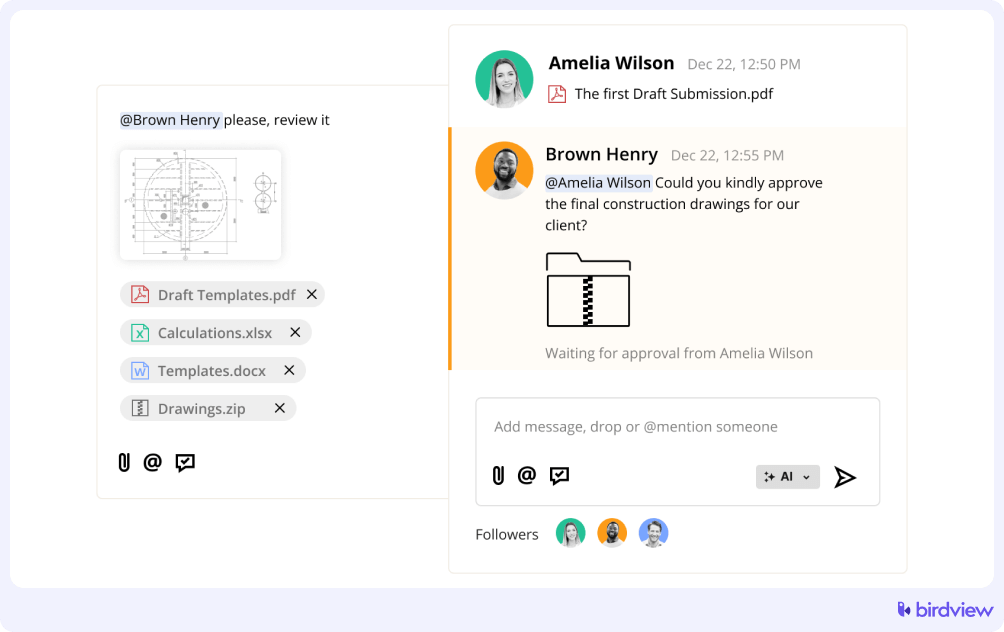
6. Real-time notifications
Every project management tool should offer a notification feature designed to keep every team member informed in the way that suits them best. Whether through email, desktop alerts, or customized rules, staying on top of your tasks and communication should be easy.
When you choose project management software, it should be able to offer customization options for desktop and email notifications to suit your personal preferences when using project tracking software. If you prefer email, Birdview allows you to receive email notifications directly from the platform. For those who prefer not to keep checking their email or dashboard, you can set up desktop notifications.
Another project management tool requirement for notifications is the flexibility to choose who gets notified when a message is sent. This selective notification helps keep relevant team members in the loop without overwhelming others with unnecessary information. Even if you’re not directly involved in a task, the software should ensure you can still monitor its progress. This feature is particularly useful for managers and team leaders who need to oversee the advancement of various projects.
7. Client and stakeholder collaboration
Communication and collaboration play a critical part in every project‘s success. Many projects fail, and potential clients choose to walk away simply because of communication problems. In fact, according to this communication statistics report published by Project.co, 96 percent of people believe that the firms they have done business with could improve communication and project management. Therefore, your project management software should help you improve communication within your team and between the team and the client.
Built-in project collaboration tools help make sure that responsibilities, goals, and expectations are clear from the get-go. These tools also help streamline communication and facilitate collaboration. If your project management software does not have an efficient collaboration tool, it’s time to explore other options.
You should be able to customize desktop and email notifications to suit your personal preferences using project tracking software.
Some project management software also offers a free guest/client portal that allows stakeholders and non-users to view progress and sign off on approvals.
8. Monitoring, reporting and analytics
You should have access to monitoring and reporting tools to get an overview of how the project is doing. Ideally, your project management software will have project reports and dashboards where you can view real-time updates complete with visuals like charts and graphs. Project dashboards help everyone involved in the project stay updated about how much of the work has been completed, which tasks are in progress, and how much time is left before completion, among other important metrics. Dashboards should be customizable to allow you to set preferences and display only the KPIs and data that matter. Likewise, project dashboards should be easy to read and interpret. Factors that affect its scannability include layout, colors, fonts, white spaces, and amount of information.
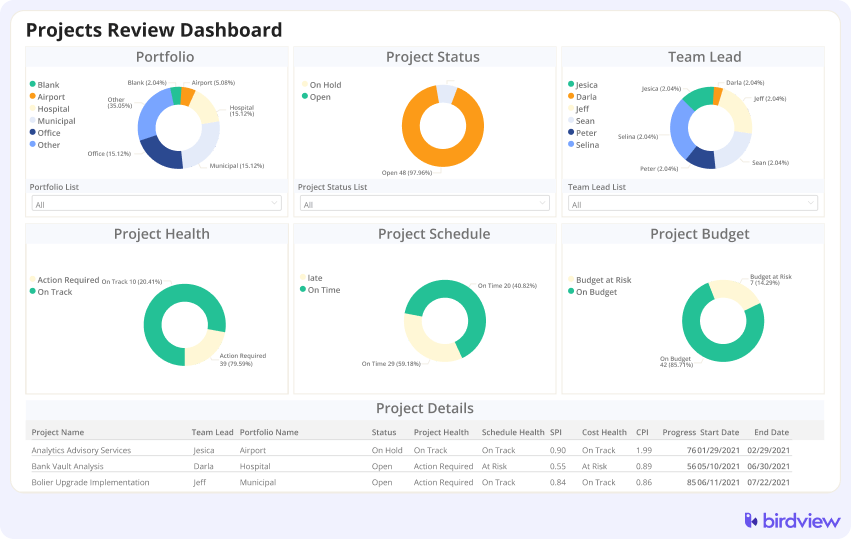
Project dashboards should also be accessible in that they can be shared with stakeholders and external users. Typically, you would do this by generating a shareable link that lets them see the updates without granting them access to the system itself. Accessibility also entails the ability to be viewed from any type of device.
9. Customization 0ptions
A project management system should allow customization to make it perform exactly the way you want it. For example, templates are pre-formatted to enable users to use them as soon as needed, thereby saving time and effort. However, you should still be able to edit it and adjust it according to your needs as well. Workflows should also be customizable to include more appropriate status labels and arrange them in a particular sequence according to your established process.
Customizing workflows enhances communication and collaboration within your project team by tailoring the business environment to meet specific needs. This involves setting up workflows for each project stage, configuring custom properties, fields, and roles, creating bespoke project and task cards, and implementing color coding for various properties.
10. Document management
Document management helps you automate the process of capturing, storing, retrieving, and distributing documents, thereby enhancing efficiency and reducing cost. Meanwhile, document control will allow you to track versions of a document and grant access to a person with a need to view or edit. It also provides added security by preventing unwanted access while providing an audit trail to ensure compliance with established regulations. For instance, Birdview is integrated with popular document management systems, such as Sharepoint and OneDrive, to make it easier for users to share and access their files in one place.
11. Integrations
Project management software should have the ability to be easily integrated with the tools your organization already utilizes. Being able to import data from another application allows seamless sharing of data without losing crucial information. Conversely, when you are left with no choice but to collect and manage data from separate sources, you run the risk of compromising your data and wasting employee productivity. Birdview offers 5000+ integrations with the most popular tools and applications.
12. Security
Lastly, but equally important, you need to look for secure project management software. This is especially true if you will use online project management software. The system should provide ample authentication and encryption measures to ensure that only authorized access is granted access and that data does not leak outside the organization. The Birdview-hosted accounts are powered by Microsoft Azure cloud.
13. Customer support
No matter how great a product is, glitches and system issues will surface over time. This is why after-sales is essential, especially if no one in the team is equipped with the technical know-how to fix even minor problems. Beforehand, you should be able to ask if the provider offers any type of technical support, and if they provide multiple-channel or single-channel support. Response time is also crucial as more extended downtimes can seriously affect your ability to meet your deadlines.
How to choose the right project management software
Choosing the best project management tools and software boils down to which fits your organizational goals and objectives. To help you find the perfect fit, ask for a trial period and see if it meets your performance expectations. And don‘t forget to include your future needs when evaluating the product. The last thing you need is swapping cars in the middle of a race.
Test
Before you choose project management software, begin by identifying a few top project management software options that align with your team’s size, industry, and specific requirements. Many providers offer free trials or demo versions, so take advantage of these to get hands-on experience. During this phase, encourage your team to use the software for various tasks to see how well it integrates with your existing workflows and how intuitive the user interface is.
Evaluate
After testing, gather feedback from your team about their experiences. Evaluate how each software meets your list of must-have features, such as task management, reporting capabilities, ease of use, mobile access, and integration with other tools. Pay close attention to any recurring issues or limitations noted by your team members. Also, assess the responsiveness and helpfulness of each software’s customer support, as ongoing support is critical for resolving future issues.
Choose
With thorough testing and evaluation completed, weigh the pros and cons of each option based on your team’s feedback and your assessment. Consider factors such as cost, scalability, security features, and the ability to customize the software to fit your team’s needs. Choose the software that not only fits your current workflow but also has the capacity to grow with your organization. Below you can find the top three tools that you can try out for your organization.
Top 3 project management tools
Based on the must-have features mentioned above, we have created a list of the top 3 project management software that can be used in your organization‘s day-to-day operations.
Birdview
Birdview project management tool is designed to offer a holistic approach to project and professional services automation, catering especially to client-focused businesses. It excels in resource management, project planning, and performance analytics, providing a comprehensive dashboard that helps businesses streamline operations and enhance decision-making.
Free version/Trial: A free 28-day trial is available.
Price: Starts from $9. Sign up for a free 14-day trial that can be extended up to 28 days to explore Birdview possibilities, or schedule a demo call with one of our managers to walk you through the platform.
Workfront
Workfront is well-suited for managing complex workflows across various departments within large organizations. It integrates seamlessly with other enterprise tools like Adobe Creative Cloud, offering robust features for managing tasks, documenting workflows, and facilitating real-time collaboration across teams.
Free version/Trial: No free trial is available.
Price: Prices are available at request.
Asana
Asana is a project management software known for its user-friendly interface and effective task management capabilities. It helps teams organize projects, track the progress of tasks, and manage deadlines with ease. Asana supports both list and board views, making it adaptable to different project management styles and highly effective for team collaboration and communication.
Trial: A free 30-day trial is available.
Price: Starts from $10.99.
These are only a couple of tools you can consider for your project management needs. Check out the rest of the best project management software in this article.
Read more: 20 best project management tools in 2024

